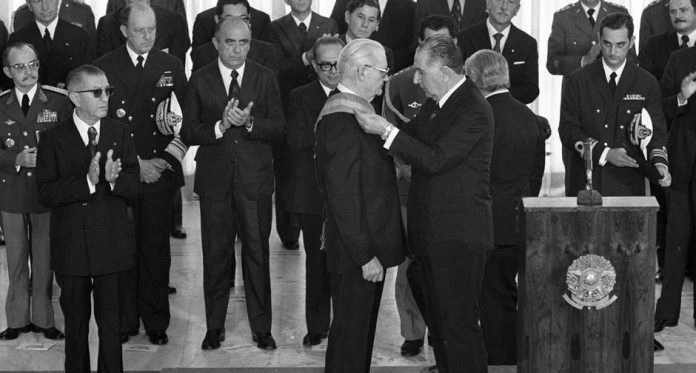CHAPTER 1, Part 1: Rotten Apple
So, after some time lurking and posting in chat, I finally decided to post a TL! Wish me luck!
-----------------
Chapter 1: Decay and Fall
Part 1: Rotten Apple
When we think of the 1980s, we think of change and turmoil. Nothing was safe from it. Technology, culture, economics and politics. Not even the seemingly impenetrable Iron Curtain could contain it. As such, it is very safe to say that Latin America too was caught in the tide.
Brazil was no exception.
Since 1964, the country was ruled by a military dictatorship, where the people were unable to elect their own presidents, governors, or capital mayors. The best they could do was voting for deputies and senators, who could belong to only two parties, the ARENA (government) and MDB (the "opposition"). And, thanks to the 1977 Pacote de Abril (Abril Package), the president, a general elected by Congress, could appoint one third of the Senate, effectively ensuring an ARENA majority in the upper house.
It used to be even worse.
With the Institutional Act Number 5 (AI-5), written in 1968, the president could effectively shut down Congress and rule by decree for as long as he wanted. Dissent was repressed with unsurprising savagery, with police brutality, torture and exile being the law of the land. But said law was abolished in 1978, not long after the imposition of the April Package. The brutality of the "Anos de Chumbo" of president Emílio Médici was replaced by the "slow, safe and gradual opening" of Ernesto Geisel, his successor.

Médici handing over the presidency to Geisel.
The government was becoming unpopular. Its economic policy consisted of borrowing huge amounts of money from the IMF to finance hugely expensive public infrastructure works gave the country a GDP growth rate that was as high as 14% in 1973. It also had the effect of creating huge amonts of debt, and, after the 1973 oil shock, this growth rate beagan to recede. These policies affected the lives of millions of ordinary brazilians, and many found that, after a few initial years of euphoria, their lives were actually changing for the worse. The slow democratization allowed these very same people to speak their mind more freely, and, eventually, openly demonstrate against the government.
In 1978, Geisel was succeded by João Figueiredo, a fellow supporter of liberalization. By then the economy moved closer and closer to a recession. Under immense pressure, he signed a law that gave amnesty to every opponent of the government, from guerrillas in the late 60s and early 70s, all sorts of artists, and politicians who were forced into either and early retirement or exile thanks to the 1964 coup d'etat. It also amnestied the torturers, shielding them from responding to their crimes. The dictatorship's days were numbered from the moment the law was signed.

The triumphant return of Miguel Arraes, former governor of Pernambuco, from exile.
-----------------
So far, it's all OTL.
-----------------
Chapter 1: Decay and Fall
Part 1: Rotten Apple
When we think of the 1980s, we think of change and turmoil. Nothing was safe from it. Technology, culture, economics and politics. Not even the seemingly impenetrable Iron Curtain could contain it. As such, it is very safe to say that Latin America too was caught in the tide.
Brazil was no exception.
Since 1964, the country was ruled by a military dictatorship, where the people were unable to elect their own presidents, governors, or capital mayors. The best they could do was voting for deputies and senators, who could belong to only two parties, the ARENA (government) and MDB (the "opposition"). And, thanks to the 1977 Pacote de Abril (Abril Package), the president, a general elected by Congress, could appoint one third of the Senate, effectively ensuring an ARENA majority in the upper house.
It used to be even worse.
With the Institutional Act Number 5 (AI-5), written in 1968, the president could effectively shut down Congress and rule by decree for as long as he wanted. Dissent was repressed with unsurprising savagery, with police brutality, torture and exile being the law of the land. But said law was abolished in 1978, not long after the imposition of the April Package. The brutality of the "Anos de Chumbo" of president Emílio Médici was replaced by the "slow, safe and gradual opening" of Ernesto Geisel, his successor.

Médici handing over the presidency to Geisel.
The government was becoming unpopular. Its economic policy consisted of borrowing huge amounts of money from the IMF to finance hugely expensive public infrastructure works gave the country a GDP growth rate that was as high as 14% in 1973. It also had the effect of creating huge amonts of debt, and, after the 1973 oil shock, this growth rate beagan to recede. These policies affected the lives of millions of ordinary brazilians, and many found that, after a few initial years of euphoria, their lives were actually changing for the worse. The slow democratization allowed these very same people to speak their mind more freely, and, eventually, openly demonstrate against the government.
In 1978, Geisel was succeded by João Figueiredo, a fellow supporter of liberalization. By then the economy moved closer and closer to a recession. Under immense pressure, he signed a law that gave amnesty to every opponent of the government, from guerrillas in the late 60s and early 70s, all sorts of artists, and politicians who were forced into either and early retirement or exile thanks to the 1964 coup d'etat. It also amnestied the torturers, shielding them from responding to their crimes. The dictatorship's days were numbered from the moment the law was signed.
The triumphant return of Miguel Arraes, former governor of Pernambuco, from exile.
-----------------
So far, it's all OTL.
Last edited:


